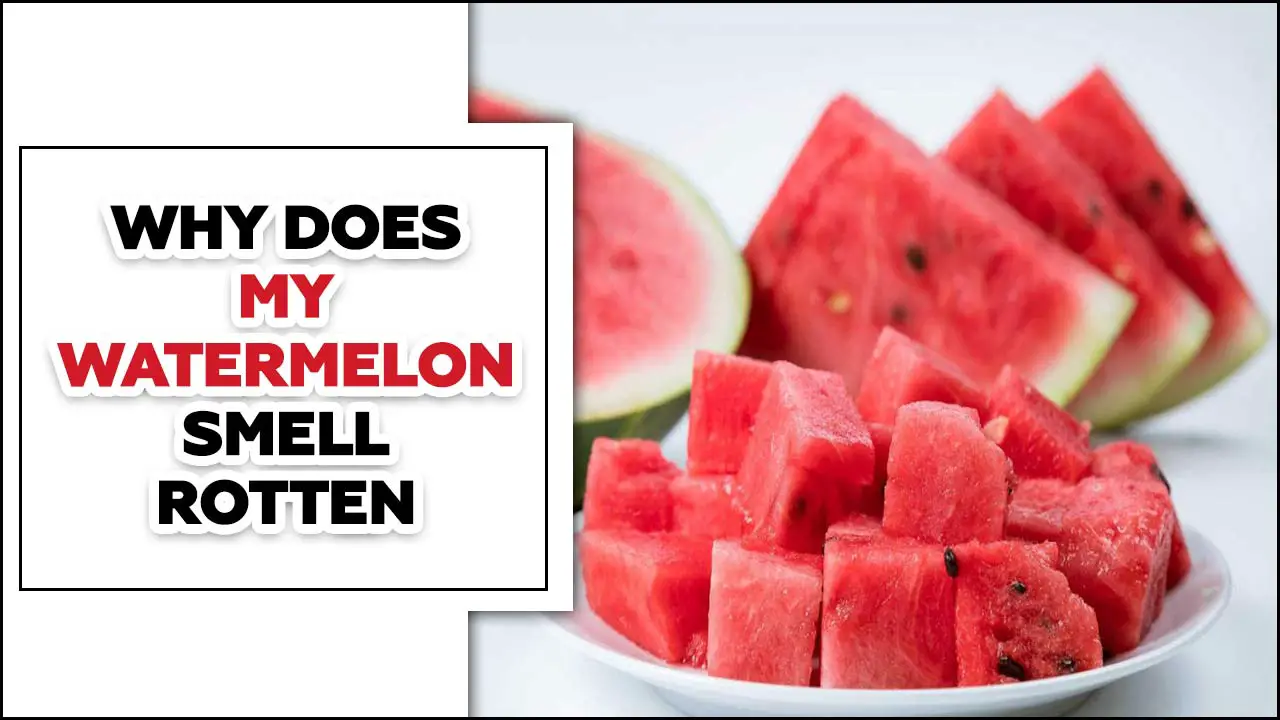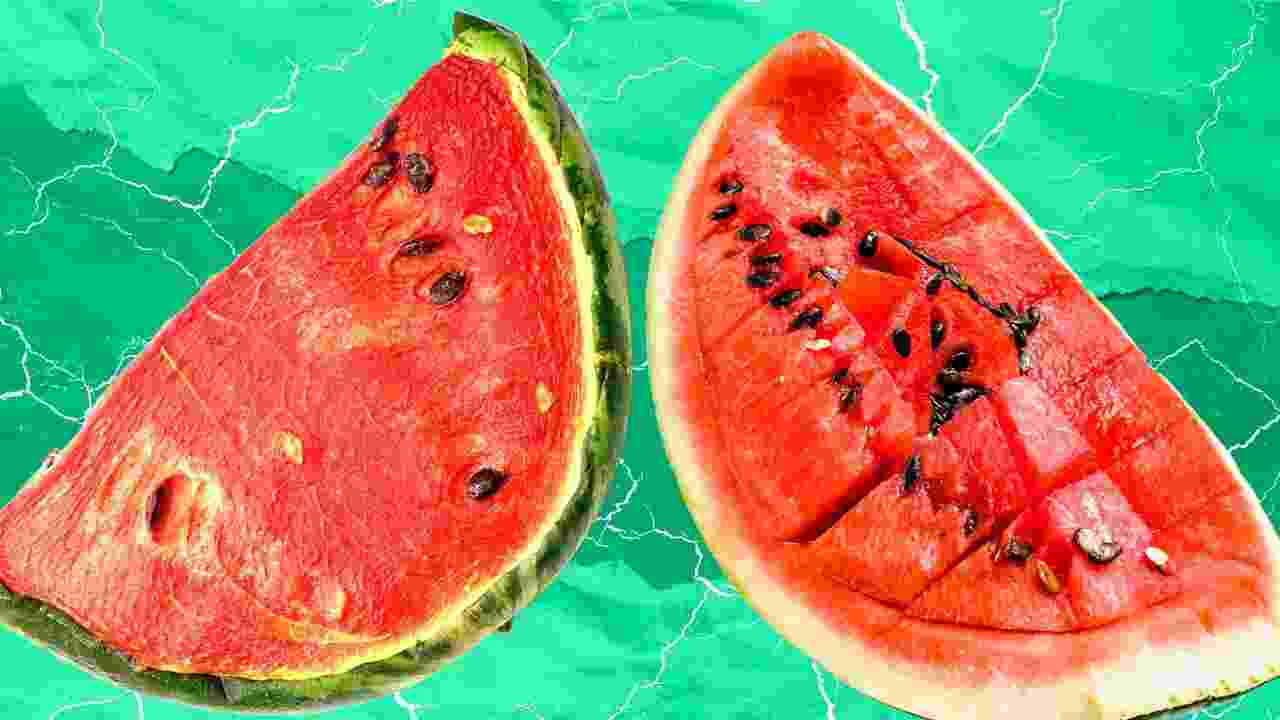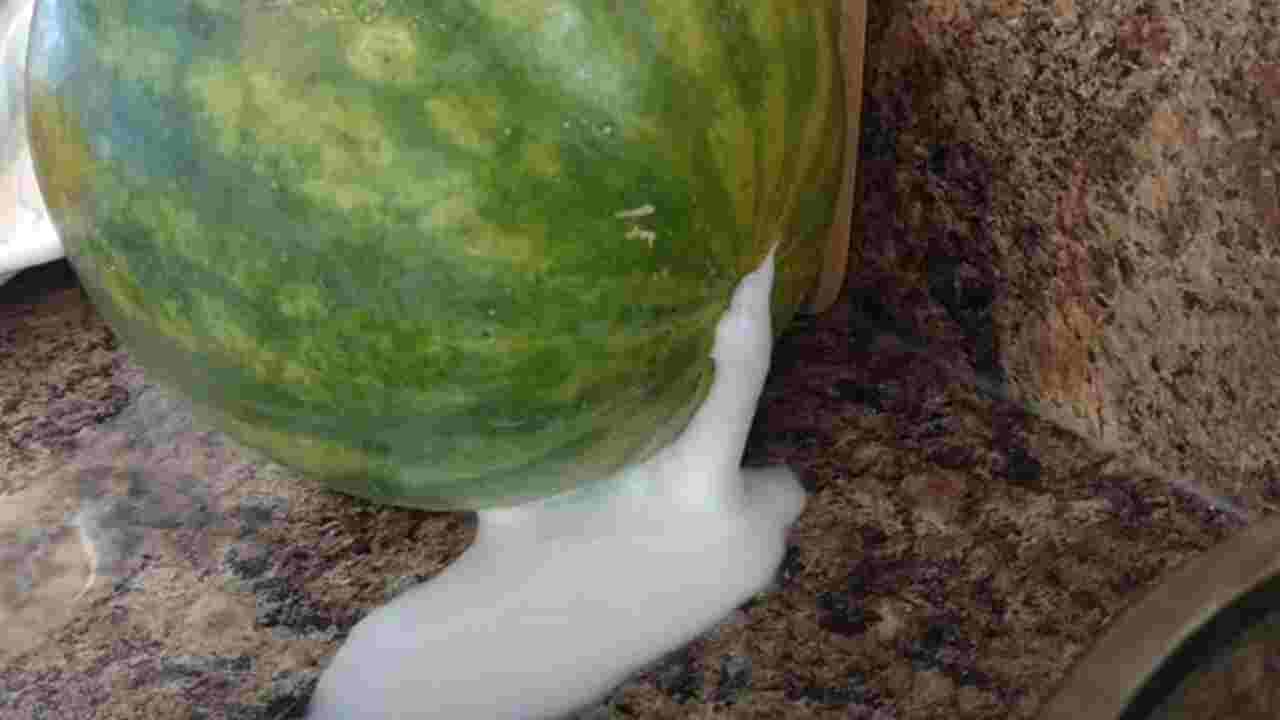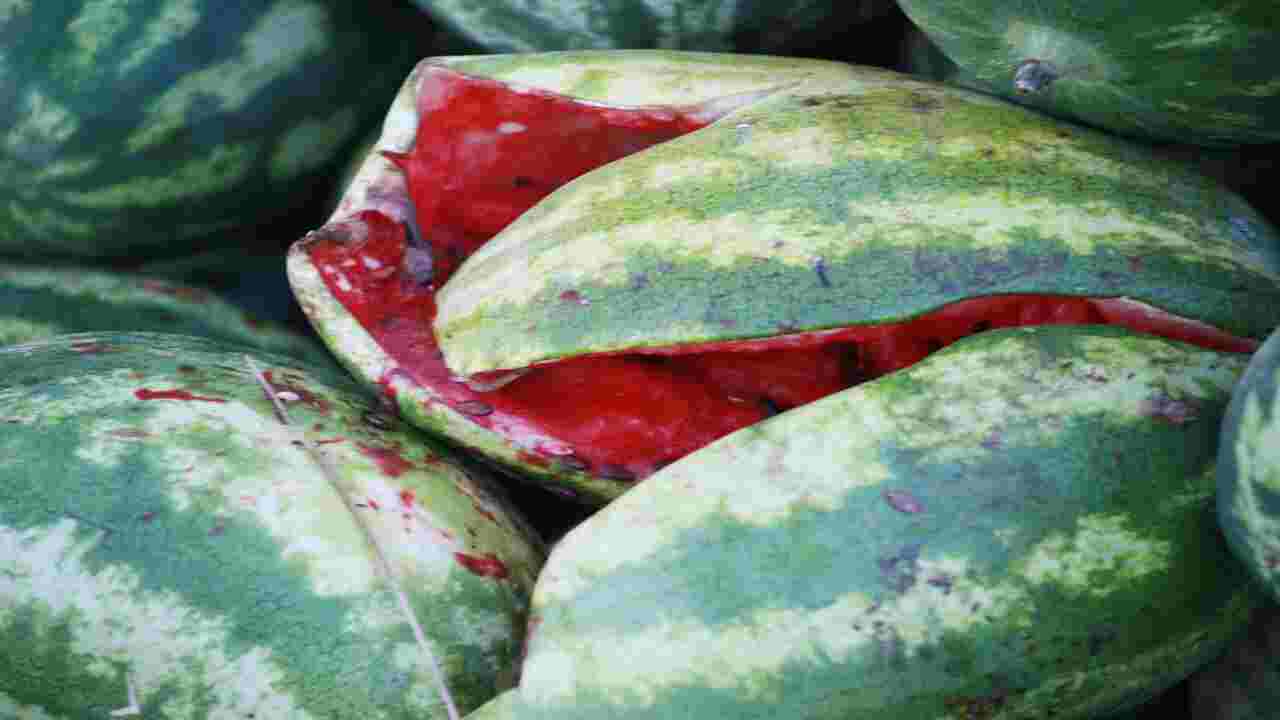There are a lot of things that can go wrong with watermelons. They may rot before you can use them, and their weight could damage them. But this is one thing that rarely happens: rotting watermelon smell.
The smell of rotten watermelon flesh is no joke. The moment it appears in your home, there’s something wrong. And the problem can be easily solved.
Here, we will explore the various factors that can contribute to a watermelon having a foul odor, as well as how to prevent it from happening in the first place.
From proper storage techniques to signs of spoilage, we will delve into the science behind a rotten watermelon and provide practical tips to ensure that your next watermelon is as delicious as it is fragrant. So, read on.

Contents
- 1 Why Does My Watermelon Smell Rotten? Know The Fact!
- 2 Overripe Watermelon
- 3 Poor Storage Conditions
- 4 Temperature And Humidity Levels
- 5 Exposure To Sunlight Or Heat
- 6 Bacterial Growth
- 7 Mold Or Fungal Growth
- 8 Internal Decay
- 9 Contamination
- 10 Signs Of Spoilage In A Watermelon
- 11 How To Get Rid Of Rotten Smell Of Watermelon
- 12 Taste And Smell Changes:
- 13 Smell Hallucinations Exist Too, And Could Be A Sign Of Health Problems:
- 14 Tips For Choosing A Sweet And Flavorful Watermelon
- 15 How To Store Watermelon
- 16 Frequently Asked Questions [ FAQs ]
- 17 What Does Watermelon Smell Like When It’s Bad?
- 18 Is Spoiled Watermelon Poisonous?
- 19 Is Overripe Watermelon Safe To Eat?
- 20 Why Is There White Stuff In My Watermelon?
- 21 Why Do You Soak Watermelon In Water?
Why Does My Watermelon Smell Rotten? Know The Fact!

It is very important to know why does my watermelon smells rotten. Watermelons emit a distinct smell due to ethylene gas, a hormone that aids in ripening and sweetness. However, as ethylene concentration increases, it becomes unpleasant.
Olfactory receptors detect this odour. Rotting watermelons can be internal, with bacteria infecting the fruit, or external, with decay affecting the outer layer. Here we discuss the possible reasons.
Overripe Watermelon

Several factors can cause overripe watermelon. One common cause is excessive exposure to heat or sunlight, which accelerates the ripening process. Another reason could be improper storage, where the watermelon is kept in warm or humid conditions.
Additionally, bacterial or fungal growth on the fruit’s skin can contribute to a rotten smell. It is important to properly store and handle watermelons to prevent them from becoming overripe and developing an unpleasant odor.
Poor Storage Conditions
Poor storage conditions can be one of the main causes behind the unpleasant odor of a watermelon. Factors such as excessive heat, moisture, and improper ventilation can lead to the growth of bacteria and fungi on the fruit’s surface, resulting in a rotten smell.
It is important to store watermelons in a cool, dry place to maintain their freshness and prevent them from spoiling prematurely. Proper storage practices can help preserve the sweet and refreshing aroma of a ripe watermelon.
Temperature And Humidity Levels

Various factors, including temperature and humidity levels can cause the smell of a rotten watermelon. Watermelons can spoil quickly when exposed to high temperatures, leading to a foul odor.
Additionally, if the humidity is high, it creates a favorable environment for bacteria growth, which can accelerate the rotting process and contribute to the unpleasant smell. Therefore, it is essential to store watermelons in a cool and dry place to maintain their freshness and prevent them from smelling rotten.
Exposure To Sunlight Or Heat

Exposure to sunlight or heat can be significant factors contributing to the unpleasant smell of a watermelon. When a watermelon is left in direct sunlight or exposed to high temperatures, it can accelerate the rotting process.
The heat causes the fruit to break down, producing a foul odor. It is important to store watermelons in a cool, shaded area to maintain their freshness and prevent them from smelling rotten.
Bacterial Growth
Bacterial growth is one of the main causes behind the unpleasant smell of a rotten watermelon. When bacteria break down the fruit’s sugars, organic compounds are produced, resulting in a foul odor.
Environmental factors such as high humidity and warm temperatures also create the perfect conditions for bacterial growth. Discarding any watermelon with a rotten smell is important to avoid consuming harmful bacteria.
Mold Or Fungal Growth

One possible cause is improper storage, where high humidity or warm temperatures create a suitable environment for mold to develop. Additionally, physical damage to the watermelon can provide an entry point for fungi to grow. It is important to handle and store watermelons properly to prevent these issues and ensure fresh and enjoyable fruit.
Internal Decay
Internal decay in watermelons can occur due to various factors. One common cause is bacterial or fungal growth, which leads to the production of chemicals that emit a foul odor, giving the watermelon a rotten smell.
Other potential causes include improper storage, damage during transportation, or overripe fruit. To prevent this, it is crucial to inspect watermelons for signs of decay before purchasing and to store them in a cool, dry place.
Contamination
Contamination in watermelons can be caused by various factors, leading to the unpleasant smell of rot. One common cause is the presence of harmful bacteria, such as Salmonella or E. coli, which can contaminate the fruit during cultivation, harvesting, or storage.
Additionally, mold growth due to improper handling or storage conditions can also contribute to the foul odor. It is crucial to ensure proper hygiene practices and storage conditions to prevent the contamination and maintain the freshness of watermelons.
Signs Of Spoilage In A Watermelon

Many enjoy Watermelons, a popular and refreshing fruit, especially during the summer months. However, knowing the signs of spoilage in a watermelon is important to ensure its freshness and quality.
The surface of the watermelon appears discoloured and has a strange odour, indicating it might be rotten. Time pressure can cause a watermelon to smell rotten if left uneaten for too long.
- Foul smell
- Mold or discoloration
- Soft or mushy texture
- Off taste
- Excessive juice
- Dull appearance
- Wrinkled or shriveled skin
- Hollow sound
How To Get Rid Of Rotten Smell Of Watermelon

To remove the rotten smell from the watermelon, soak it in a solution of one part white vinegar and two parts water. Alternatively, refrigerate the watermelon in a sealed container for three days.
If the smell persists, clean it by soaking it under running water and rinsing it with cold water before storing it. Keep the melon cool until ready to eat, or discard it within 48 hours for optimal ripening. Using soda or dry ice can also help.
However, be cautious not to freeze the watermelon with dry ice. Remove the packaging and store it in a cool, dark place to speed up ripening. Plastic ketchup bottles can be used if liquid is in them.
Taste And Smell Changes:
Watermelon is one of the most popular summer fruits; for a good reason – it’s delicious! However, if your watermelon smells bad, there could be a reason. Taste and smell changes are common during the summertime when the fruit is at its ripeness.
This is when the watermelon’s sugar water levels spike, leading to the smell of rotting fruit. To avoid this, keep an eye on the watermelon’s colour and shape – they should be deep green, and the rind should be smooth. If the watermelon isn’t perfect, don’t eat it.
Smell Hallucinations Exist Too, And Could Be A Sign Of Health Problems:
Watermelon smell hallucinations may sound like something from a horror movie. But they exist and could be a sign of health problems. Smell hallucinations generation is defined as the experience of smell sensations that are not present. Fermentation is commonly used to produce various alcoholic beverages, such as wine and beer.
They can take many different forms, from watermelon smell hallucinations to the smell of rotting food. They can signify several health problems, from migraines to dementia. If you think you might be experiencing a smell hallucination, it’s best to consult a doctor.
Tips For Choosing A Sweet And Flavorful Watermelon

Regarding choosing a sweet and flavorful watermelon, a few tips can help you make the best selection. First and foremost, it’s important to look for a watermelon that has a uniform shape and is free from any major blemishes or bruises.
Different flavours of watermelon can vary in aroma, from sweet and juicy to slightly tangy. This indicates that the fruit has ripened evenly and is less likely to have internal issues.
- Uniform shape and symmetrical
- Look for a yellow spot or creamy spot on the bottom
- Tap for a deep, hollow sound
- Heavy for its size
- Firm, smooth skin without cuts or bruises
- No white streaks or green patches
- Consider a smaller size for a sweeter taste
- Strong, sweet fragrance
- Ask for a sample slice if possible
How To Store Watermelon

Storing watermelon properly is essential to keep it fresh and delicious for as long as possible. Here is a step-by-step guide on how to store watermelon. By following these steps, you can enjoy fresh and juicy watermelon whenever you’re ready to indulge!
- Choose A Cool, Dry Place: Find a cool spot in your home, such as a pantry or basement, where the temperature remains between 50-60°F (10-15°C). Avoid storing it in direct sunlight or near heat sources.
- Keep It Whole: Leave the watermelon whole until you are ready to consume it. Cutting it exposes the flesh to air and can cause it to spoil more quickly.
- Wash And Dry: Before storing, wash the watermelon with clean water and pat it dry with a clean towel. This helps remove any dirt or bacteria on the surface.
- Wrap In Plastic Wrap: Wrap the watermelon tightly in plastic wrap or place it in a sealed plastic bag. This helps prevent moisture loss and keeps the fruit juicy.
- Place In Refrigerator: Store the wrapped watermelon in the refrigerator to maintain its freshness. It can be stored for up to two weeks, but try to consume it within one week for optimal taste.
Conclusion
A watermelon that smells rotten may indicate spoilage and should be avoided. While there are several reasons why a watermelon could have a foul odour, it is important to inspect the fruit carefully before purchasing or consuming it.
If you are still unsure whether your watermelon is safe to eat, consult a professional or visit your local farmer’s market for guidance. Remember, choosing the right watermelon can make all the difference in the taste and quality of your summertime fruit salad.
We hope now you understand why my watermelon smells rotten. You can use vinegar or lemon juice to get rid of the rotten watermelon smell, but if it doesn’t work, there are other ways that you can try.
Frequently Asked Questions [ FAQs ]
What Does Watermelon Smell Like When It’s Bad?
When watermelon is bad, it typically has a foul, rotten smell. The scent can be pungent, musty, or even slightly mouldy.
Is Spoiled Watermelon Poisonous?
No, spoiled watermelon is not necessarily poisonous, but it may cause stomach discomfort and digestive issues if consumed. Watermelon is a popular summer fruit loved for its refreshing taste and high water content.
Is Overripe Watermelon Safe To Eat?
Yes, overripe watermelon is generally safe to eat. However, it may not be as enjoyable in taste and texture as a ripe watermelon.
Why Is There White Stuff In My Watermelon?
The white stuff in your watermelon is likely pith, the spongy white layer between the rind and the fruit’s flesh. Pith is completely normal and safe to eat.
Why Do You Soak Watermelon In Water?
Soaking watermelon in water is done to enhance its juiciness and crispness. The water helps rehydrate the fruit and make it more refreshing, especially if the watermelon has been sitting out for a while or is not as ripe as desired.
